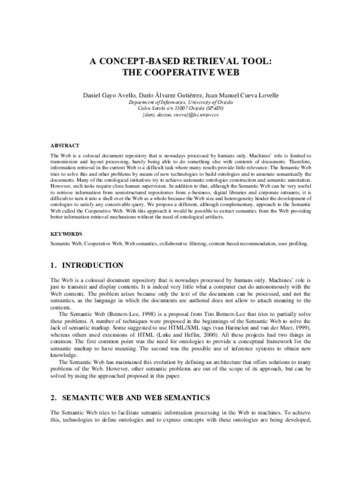A concept-based retrieval tool: The cooperative Web
Autor(es) y otros:
Palabra(s) clave:
Semantic Web
Web Semantics
Collaborative Filtering
Content-Based Recommendation
User Profiling
Fecha de publicación:
Editorial:
IADIS
Resumen:
The Web is a colossal document repository that is nowadays processed by humans only. Machines' role is limited to transmission and layout processing, barely being able to do something else with contents of documents. Therefore, information retrieval in the current Web is a difficult task where many results provide little relevance. The Semantic Web tries to solve this and other problems by means of new technologies to build ontologies and to annotate semantically the documents. Many of the ontological initiatives try to achieve automatic ontologies construction and semantic annotation. However, such tasks require close human supervision. In addition to that, although the Semantic Web can be very useful to retrieve information from semistructured repositories from e-business, digital libraries and corporate intranets, it is difficult to turn it into a shell over the Web as a whole because the Web size and heterogeneity hinder the development of ontologies to satisfy any conceivable query. We propose a different, although complementary, approach to the Semantic Web called the Cooperative Web. With this approach it would be possible to extract semantics from the Web providing better information retrieval mechanisms without the need of ontological artifacts.
The Web is a colossal document repository that is nowadays processed by humans only. Machines' role is limited to transmission and layout processing, barely being able to do something else with contents of documents. Therefore, information retrieval in the current Web is a difficult task where many results provide little relevance. The Semantic Web tries to solve this and other problems by means of new technologies to build ontologies and to annotate semantically the documents. Many of the ontological initiatives try to achieve automatic ontologies construction and semantic annotation. However, such tasks require close human supervision. In addition to that, although the Semantic Web can be very useful to retrieve information from semistructured repositories from e-business, digital libraries and corporate intranets, it is difficult to turn it into a shell over the Web as a whole because the Web size and heterogeneity hinder the development of ontologies to satisfy any conceivable query. We propose a different, although complementary, approach to the Semantic Web called the Cooperative Web. With this approach it would be possible to extract semantics from the Web providing better information retrieval mechanisms without the need of ontological artifacts.
Descripción:
IADIS International Conference WWW/Internet 2002, Lisboa (Portugal)
ISBN:
Colecciones
- Informática [875]
- Ponencias, Discursos y Conferencias [4233]
Ficheros en el ítem





